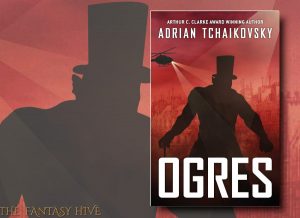OGRES by Adrian Tchaikovsky (BOOK REVIEW)
 This copy was provided to me by @rebellionpublishing and @netgalley
This copy was provided to me by @rebellionpublishing and @netgalley
‘Ogres are bigger than you, Ogres are stronger than you, Ogres rule the world,’
Ogres, Adrian Tchaikovsky – Coming March 15th 2022, Rebellion Publishing – Solaris
‘Everyone Cheers. Hooray for the Ogres’
Lucy Nield PhD Candidate, University of Liverpool. Twitter: @lucy_nield1 Instagram: @lucy_dogs_books
Adrian Tchaikovsky is the author of the acclaimed ten-book Shadows of the Apt series, the Echoes of the Fall series, and other novels, novellas and short stories including Children of Time (which won the Arthur C. Clarke award in 2016), and its sequel, Children of Ruin (which won the British Science Fiction Award in 2020). He lives in Leeds in the UK and his hobbies include entomology as well as board and role-playing games.
Ogres is Adrian Tchaikovsky’s latest novel, yet another piece of evidence that Tchaikovsky is an expert in the craft of World building. After his previous examples of expertise, including Arthur C. Clarke Winner Children of Time (2016) and Doors of Eden (2020), we needed little convincing of the fact, but upon entering the world of Ogres, you are reminded of Tchaikovsky’s undeniable skill, as you are engulfed by a new world and a flawlessly engaging narrative.
“They’ve always been there, your Masters the ogres.
All your life and your father’s life and your grandfather’s.”
Torquell is the son of the headman of his village. Living in the farmlands of a fantastical land, Torquell is part of a peasant community who inhabit the village work hard for the Landlord, who’s visit is overdue. In an interview, Tchaikovsky describes Torquell as ‘a bit of a rascal,’ as he steals apples, causes general chaos, and runs off with a group of outlaws in the woods, just before the Landlord arrives. The narrative is constructed in a way that forces you to make assumptions about the setting. With achingly obvious, yet brilliant, allusions to Robin Hood:
‘The leader of the outlaws in the wood is called Roben. And yes, he wears a hood’
There are echoes of the band of ‘Merry men’ and nods towards ‘Merry Greenwood,’ having similarities to Robin Hoods homestead of Sherwood Forest. Tchaikovsky seems to consciously position the novel in this fantastical medieval-style village to ground you in this setting. It is only when the Landlord comes to visit that these assumptions do not seem to fit and things begin to unravel. The introduction of the Ogres and their magic, human genetic vegetarianism, the weirdly oppressive (but not unfamiliar) attitude of the church and the Ogres ideology, force you to begin to ask questions that you know will have morose answers. The more you read the more you wonder… Who are the Ogres? Where do they come from? And why can’t people eat meat…?
‘You beat the world. You did something they say people just can’t do. Just as they say you can’t kill an ogre’
Upon entering Tchaikovsky’s latest novella, you are instantly confronted by an aggressive narrator. Tchaikovsky boldly selected a second person narrative, and whilst this could lead to an arguably more reliable and trustworthy narrator (as they know everything), I actually found it quite uncomfortable. The narrator talks to the reader as though narrating Torquell’s life for him.. “you did this..” and “you did that..” The tone is accusatory and blunt, which gives the whole text a strange aesthetic. The entire time you are reading you feel a twinge of guilt or of grief, as though you have done something wrong. As you read on and discover the Ogre’s secrets, this guilty conscious begins to make more sense and Tchaikovsky’s bold choice evolves into something genius, unexpected and admirable.
I have decided to avoid spoilers, as this novel works stupendously when you do not know what is coming. I feel spoilers would ruin the twists and turns of Torquell’s life as well as his revelations about the Ogres and the world as he knows it. What I will say, is that Tchaikovsky expresses his concerns and fears for humanity through this narrative seamlessly. In an interview he expressed:
‘My fears for the future are all entirely based on the way that we, as a species, are going to screw it up. Most especially the ways in which we are going to destroy the natural world, and the only planet we know of that has a natural world. […] to a certain extent everything I have written is a eulogy for all the things that were on the brink of being driven to extinction. And I think driven to extinction by human stupidity and human selfishness. The future I am seeing is that we are going to destroy our own civilisation, but we will make sure to destroy everything else first.’
These concerns echo loudly throughout Ogres. Whilst also lingering throughout Tchaikovsky’s other work too, such as Ironclads, Firewalkers and Bear Head.
‘There were so many things about people that were broken…’
The communities in this novel thrive on an ideology constructed by the Ogres, ‘The Master in his castle, as the hymn goes, the poor man at the gate.’ In a way that I can only describe as wildly Orwellian. The repression and ideological control reeks of Capitalism, as well as Louis Althusser’s ‘ghost in the machine’ of capitalism; ideology on reproductions of labour-power and conformity. I fear I will give away too much if I provide examples, but trust me, the narrative is nuanced and sublime, a delicately measured-out cocktail of themes that complement each other and terrify the reader.
Ogres is absolutely not what one would expect. Tchaikovsky plays with the readers expectations, plucking at the strings of intrigue and thrusting out familiar allusions to lull us into a false sense of security. The novels narrative voice is unsettling and weirdly aggressive, but it works incredibly well. The boldness of Tchaikovsky’s choice to do this, along-side the arrogance that lingers throughout the narrator’s tone, pack a real punch when you realise what is going on. This novel can easily stand proud with dystopian novels such as Orwell’s 1984 or Margaret Atwood’s dystopian Maddaddam Trilogy. Here is hoping that Ogres is enjoyed by many, and appreciated as more than its assumed genre, which may be fantasy… but then again, maybe it is not.

